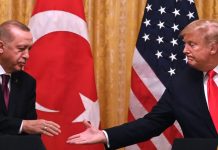Adding to the list of Canada and Pakistan claiming New Delhi’s long hands behind the mysterious deaths of Islamic and Sikh leaders on its soil, a news report has claimed that the Indian authorities hatched a plot to assassinate a Sikh separatist on American soil, but its attempt was thwarted by the US authorities.
The news report adds to the powder keg of accusations levied at India’s doors off late. Over the past few years, a slew of terrorists on New Delhi’s “most wanted list” have been dropping dead in Canada and Pakistan under mysterious circumstances.
While Canada has come out with the brazen accusation of claiming New Delhi to be behind the Sikh leader on its soil, the US has kept these claims under wraps.
A report in the Financial Times claimed that the US authorities, after thwarting “a conspiracy to assassinate a Sikh separatist on American soil,” issued a warning to India’s government over concerns it was involved in the plot.
The newspaper quoted several people familiar with the case that the target of the plot was Gurpatwant Singh Pannun, an American and Canadian citizen.
He is general counsel for Sikhs for Justice, a US-based group that supports a separate Sikh state from India called “Khalistan.” Khalistan is a separate nation demanded by the Sikh separatists based on religion (Sikhism) to be carved out from India’s Punjab state (province).
Punjab has borne the brunt of home-grown insurgency and Pakistan-sponsored terrorism for almost two decades, from the early 80s until the 90s. Most recently, Pannun had publicly threatened violence in a video cautioning Sikhs not to fly on Air India because it would be “life-threatening.”
The report is unclear about the stage at which the Federal Bureau of Investigation (FBI) intervened and if India abandoned its plan to take out Pannun. The report further adds that the US has apprised its allies of the plot after the mysterious death of Hardeep Singh Nijjar, a Canadian Sikh separatist killed in Vancouver in June 2023. A pattern emerged following the discussions among the US and its allies.
US Ambassador to Canada David Cohen also said in September that Ottawa received information about the Vancouver case from the intelligence-sharing network “Five Eyes,” which comprises the US, UK, Australia, New Zealand, and Canada.
The Financial Times further adds that the US had registered its diplomatic protest after the high-profile visit of Prime Minister Modi to Washington in June 2023. Unlike Canada, which created an international stir with its accusation, the US federal prosecutors filed a “sealed indictment” against one of the alleged perpetrators of the plot in a New York district court.
This also indicates Washington’s reluctance to disturb the strategic ties it has fostered with New Delhi to pivot its Indo-Pacific strategy.
But the report indicates that the allegations could come out in public as the US Justice Department is debating whether to unseal the indictment and make the allegations public or wait for Canada to finish its investigation into Nijjar’s alleged murder. To complicate matters further, one person charged with the conspiracy has already fled the US.
The Financial Times quoted Pannun as saying: “The threat to an American citizen on American soil is a challenge to America’s sovereignty, and I trust that the Biden administration is more than capable of handling any such challenge.”
A Long Trail Of India’s Enemies
In September, Canada’s Prime Minister Justin Trudeau, after being given a cold shoulder by Prime Minister Narendra Modi during the G-20 summit, said there were “credible allegations” linking New Delhi to Nijjar’s fatal shooting.
India has rejected Canada’s claims about New Delhi’s possible involvement in Nijjar’s murder as “absurd.”
India has repeatedly accused Canada, the UK, and other countries with large Sikh diaspora of being too tolerant of members of the Sikh separatist movement.

Hardeep Singh Nijjar, Canada-based chief of the banned Khalistan Tiger Force (KTF), was shot dead outside a gurdwara in British Columbia (Canada) on June 19. Canadian law enforcement authorities have yet to arrest the perpetrators.
Canada has been in the news since recently for organizing Khalistan-related anti-India rallies. One particular tableau glorifying the assassination of former Indian Prime Minister Indira Gandhi invited sharp censure from India. KTF has long been a supporter of the demand of Khalistan. During a visit to Washington in September 2023, Indian foreign minister S Jaishankar told a Hudson Institute event that Ottawa had a “very permissive” attitude towards Sikh separatists because of Canadian politics.
Another Khalistan supporter and Chief of the banned Khalistan Liberation Force, Avtar Singh Khanda, died due to suspected poisoning in a hospital in UK’s Birmingham on June 16. Known in the files of intelligence agencies as a ‘bomb expert,’ he was responsible for attacking and removing the tricolor from the Indian High Commission complex in London.
On May 6, a Khalistani terrorist and chief of the banned Khalistan Commando Force, Paramjit Singh Panjwar, was shot dead in Pakistan. More than a dozen terrorists who were on New Delhi’s “most wanted list” have been mysteriously killed in different parts of Pakistan over the past two years.
The Pakistani government and the banned militant organizations associated with it have remained silent about these killings. The militants who were eliminated were affiliated with Lashkar-e-Taiba (LeT), Hizbul Mujahideen (HuM), the Khalistan movement, or Jaish-e-Muhammed (JeM).
- Ritu Sharma has been a journalist for over a decade, writing on defense, foreign affairs, and nuclear technology.
- She can be reached at ritu.sharma (at) mail.com
- Follow EurAsian Times on Google News




